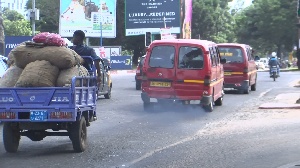- Home - News
- Elections 2024
- News Archive
- Crime & Punishment
- Politics
- Regional
- Editorial
- Health
- Ghanaians Abroad
- Tabloid
- Africa
- Religion
- Photo Archives
- Press Release
General News of Tuesday, 22 April 2025
Source: www.ghanawebbers.com
Experts demand National Clean Air Policy as air pollution deaths soar
Air quality experts are urging immediate action. They want to combine existing air quality regulations into one National Air Quality Policy.
Ghana is facing a serious air pollution crisis. The statistics are alarming.
Air pollution now causes more deaths than malaria, HIV, and tuberculosis combined.
In 2019, the World Health Organization estimated over 28,000 deaths linked to toxic air. That’s about one person every 19 minutes. If this trend continues, over 2,300 lives could be lost each month.
Two years later, the Global State of Air Report reported even higher numbers: 30,000 deaths in 2021 alone.
At a recent public lecture by the Ghana Thoracic Society, experts raised concerns again. The event took place at the British Council Hall in Accra. It focused on “A Neglected Killer: Air Pollution and the Lung.”
Desmond Appiah from the Clean Air Fund emphasized the need for policy reform. He stated there is a gap in clear air quality policy direction.
He said a national air quality policy would guide actions related to air pollution. This would ensure that anyone working in Ghana adheres to these standards.
Currently, Ghana has non-mandatory vehicle emission standards. Mr. Appiah noted this as a significant gap.
He mentioned that with the new EPA Act, efforts are underway to address these issues. The EPA is collaborating with stakeholders like DVLA and Standards Authority.
Mr. Appiah highlighted that air pollution is now the top environmental challenge globally and in Ghana. It's not just about vehicle emissions; poor waste management and dusty roads also contribute significantly.
Dr. Sandra Kwarteng Owusu shared findings from a study on schoolchildren's exposure levels to air pollution. The results were concerning.
She noted that many children had higher exposure levels while commuting to school. One school had particularly high exposure levels and many asthma cases reported among students.
Professor Kofi Amegah stressed that tackling air pollution starts with daily choices—like cooking methods and vehicle use.
He urged transitioning to clean cooking solutions like LPG instead of charcoal. He also suggested heavy taxation or restrictions on high-emission vehicles.
Professor Amegah supports taxing these vehicles as a deterrent for owners. He proposed policies for vehicle replacement options over time for owners affected by such measures.
Globally, air pollution caused an estimated 8.1 million deaths in 2021 according to the Global State of Air Report. That averages out to over 22,000 deaths each day worldwide.
The report reveals one child dies every minute due to illnesses related to air pollution.
Moreover, the 2024 Air Quality Life Index shows that global life expectancy decreases by an average of 1.9 years due to air pollution—totaling around 14.9 billion life-years lost worldwide.
Professor Jane Afriyie Mensah leads the Ghana Thoracic Society's mission for public action based on alarming data about air quality issues.
She emphasized the need for education on achieving optimal lung health among citizens.
“This situation is alarming,” she said, calling for increased awareness and action against this issue.
The society plans educational activities targeting those most at risk from air pollution.
With rising death tolls reaching 30,000 and beyond, Ghana’s air crisis demands urgent attention now more than ever.











